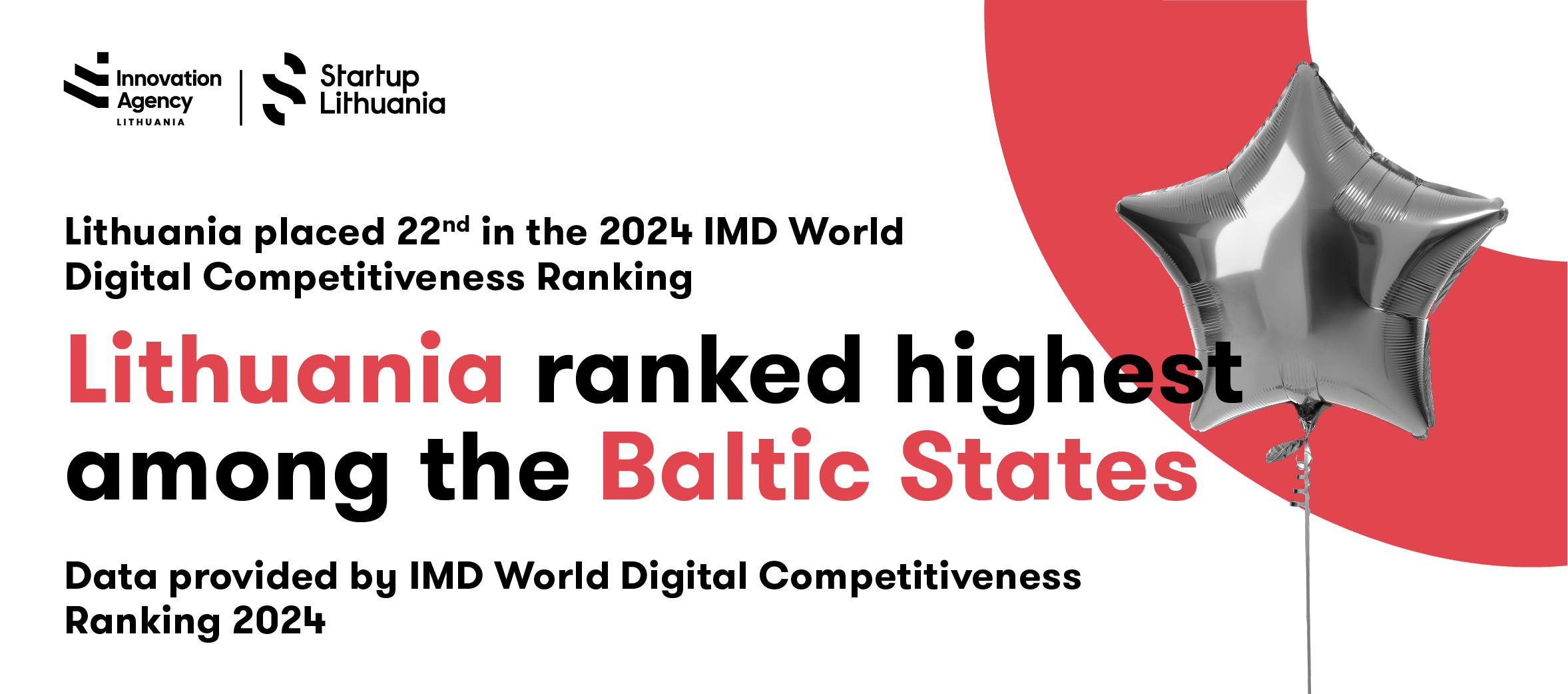Baltic Digital Leader: Lithuania Soars to 22nd in Global Digital Competitiveness
2024
Nov 20
Nov 20

In the 2024 Global Digital Competitiveness Ranking published by IMD, Lithuania climbed 6 positions, securing 22nd place out of 67 evaluated countries. The country has established itself as a leader among the Baltic states, outperforming Estonia and Latvia, with Lithuania scoring particularly well in the “readiness for the future” category, ranking 17th.
“Lithuania’s digitalization is advancing rapidly, and we see that the country’s rating has significantly improved across all categories over the year. The global community recognizes Lithuania’s readiness for future challenges, business resilience, and adaptability. This is a strength of our economy that sets us apart from other Baltic states,” says Kotryna Tamoševičienė, Head of the Research and Analysis Unit at the Innovation Agency.
This year, Lithuania surpassed Estonia in the IMD ranking, with Estonia falling from 18th to 24th place. Latvia also improved, rising from 40th to 38th. The 2024 index is led by Singapore, Switzerland, and Denmark, while the United States, which was first last year, has dropped to fourth place.
Talent Is Well-Rated
According to K. Tamoševičienė, when comparing the Baltic states, Estonia’s decline last year occurred in areas where Lithuania showed the most rapid progress, particularly in the “readiness for the future” category. After surveying business leaders, IMD researchers concluded that business agility and tolerance for business risk are rated higher in Lithuania than in Estonia.
“On the other hand, it must be acknowledged that Estonia remains a leader in cybersecurity capabilities and digital public services in the state sector, although Lithuania is also rated well in these areas,” notes K. Tamoševičienė. In the IMD ranking, Lithuania is ranked 10th for state-sector cybersecurity capabilities and 21st for the quality of digital public services.
“We can be pleased that Lithuania holds 23rd place in the knowledge category. Our talents are ranked highest at 21st, closely followed by training and education at 24th,” says K. Tamoševičienė. In the technology category, Lithuania is ranked 28th.
Education Lacks Robotics
Among the factors limiting Lithuania’s digital competitiveness, the use of robotics in educational institutions received a low evaluation.
“The ranking compilers emphasize that Lithuania has strong talent, but challenges may arise in the future in attracting highly qualified specialists. We should aim to increase the number of foreign students and workers choosing high specialization fields,” says K. Tamoševičienė.
According to the expert, these issues could be addressed through a clear and strategic national approach and rational investment in the so-called Smart Specialization priorities. These include health sciences and biotechnology, manufacturing, and the information and communication technology sector. K. Tamoševičienė suggests that focused state investment in these areas could generate high added value in the future and become a key to Lithuania’s economic success.
The Global IMD Digital Competitiveness Ranking has been published since 2017 by the International Institute for Management Development (IMD) in Switzerland. IMD focuses on studies of innovation and competitiveness, with one of its key goals being to help countries and companies assess their ability to adapt to constantly changing technological conditions. Each year, IMD provides evaluations and insights into countries’ progress in digital innovation, promoting best practices and innovative solutions.
